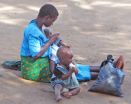(Press-News.org) Comforting a friend or relative in distress may be a more hard-wired behavior than previously thought, according to a new study of bonobos, which are great apes known for their empathy and close relation to humans and chimpanzees. This finding provides key evolutionary insight into how critical social skills may develop in humans. The results are published in the online journal PLOS ONE.
Researchers from the Yerkes National Primate Research Center, Emory University, observed juvenile bonobos at the Lola ya Bonobo sanctuary in the Democratic Republic of Congo engaging in consolation behavior more than their adult counterparts. Juvenile bonobos (ages 3 to 7) are equivalent to preschool or elementary school-aged children.
Zanna Clay, PhD, a postdoctoral fellow in Emory's Department of Psychology, and Frans de Waal, PhD, director of the Living Links Center at Yerkes and C.H. Candler Professor of Psychology at Emory, led the study.
"Our findings suggest that for bonobos, sensitivity to the emotions of others emerges early and does not require advanced thought processes that develop only in adults," Clay says.
Starting at around age two, human children usually display consolation behavior, a sign of sensitivity to the emotions of others and the ability to take the perspective of another. Consolation has been observed in humans, bonobos, chimpanzees and other animals, including dogs, elephants and some types of birds, but has not been seen in monkeys.
At the Lola ya Bonobo sanctuary, most bonobos come as juvenile or infant orphans because their parents are killed for meat or captured as pets. A minority of bonobos in the sanctuary is second generation and raised by their biological mothers. The researchers found bonobos raised by their own mothers were more likely to comfort others compared to orphaned bonobos. This may indicate early life stress interferes with development of consolation behavior, while a stable parental relationship encourages it, Clay says.
Clay observed more than 350 conflicts between bonobos at the sanctuary during several months. Some conflicts involved violence, such as hitting, pushing or grabbing, while others only involved threats or chasing. Consolation occurred when a third bonobo – usually one that was close to the scene of conflict – comforted one of the parties in the conflict.
Consolation behavior includes hugs, grooming and sometimes sexual behavior. Consolation appears to lower stress in the recipient, based on a reduction in the recipient's rates of self-scratching and self-grooming, the authors write.
"We found strong effects of friendship and kinship, with bonobos being more likely to comfort those they are emotionally close to," Clay says. "This is consistent with the idea that empathy and emotional sensitivity contribute to consolation behavior."
In future research, Clay plans to take a closer look at the emergence of consolation behavior in bonobos at early ages. A process that may facilitate development of consolation behavior is when older bonobos use younger ones as teddy bears; their passive participation may get the younger bonobos used to the idea, she says.
### END
Bonobos predisposed to show sensitivity to others
Finding important to understanding human development and shows sensitivity may not be connected to advanced thought processes
2013-01-31
ELSE PRESS RELEASES FROM THIS DATE:
Study finds parasites and poor antenatal care are main causes of epilepsy in Africa
2013-01-31
The largest study of epilepsy in sub-Saharan Africa to date reveals that programmes to control parasitic diseases and access to better antenatal care could substantially reduce the prevalence of the disease in this region.
Epilepsy is one of the most common neurological conditions worldwide and it is well known that it is significantly more prevalent in poorer countries and rural areas. The study of over half a million people in five countries of sub-Saharan Africa is the first to reveal the true extent of the problem and the impact of different risk factors.
The ...
Risk of unwarranted pregnancies with morning after pill conscience clauses
2013-01-31
[The fox and the grapes: an Anglo-Irish perspective on conscientious objection to the supply of emergency hormonal contraception without prescription Online First doi 10.1136/medethics-2012-100975]
Conscience clauses, which allow pharmacists to opt out of providing the "morning after pill" without a prescription, risk unwanted pregnancies and undermine the principle of universal healthcare in the NHS, say pharmacists in the Journal of Medical Ethics.
These clauses should either be banned or enhanced so that pharmacists and patients know exactly where they stand, rather ...
Researchers see more West Nile virus in orchards and vineyards
2013-01-31
PULLMAN, Wash.—Washington State University researchers have linked orchards and vineyards with a greater prevalence of West Nile virus in mosquitoes and the insects' ability to spread the virus to birds, horses and people.
The finding, reported in the latest issue of the journal PLOS ONE, is the most finely scaled look at the interplay between land use and with the virus's activity in key hosts. By giving a more detailed description of how the disease moves across the landscape, it opens the door to management efforts that might bring the disease under control, says David ...
BRI researchers identify biomarker and potential therapy target in multiple sclerosis
2013-01-31
(Seattle, January 30, 2013) Researchers from Benaroya Research Institute at Virginia Mason (BRI) have found that proteins in the IL-6 signaling pathway may be leveraged as novel biomarkers of multiple sclerosis (MS) to gauge disease activity and as a target for new therapies. The research, which investigated how several components involved in immune response differ between MS patient and control samples, was conducted by a team of researchers at BRI led by Dr. Jane Buckner in collaboration with Dr. Mariko Kita at Virginia Mason Medical Center and was published today in ...
3D microchip created
2013-01-31
Scientists from the University of Cambridge have created, for the first time, a new type of microchip which allows information to travel in three dimensions. Currently, microchips can only pass digital information in a very limited way - from either left to right or front to back. The research was published today, 31 January, in Nature.
Dr Reinoud Lavrijsen, an author on the paper from the University of Cambridge, said: "Today's chips are like bungalows – everything happens on the same floor. We've created the stairways allowing information to pass between floors."
Researchers ...
Disasters can prompt older children to be more giving, younger children to be more selfish
2013-01-31
A natural disaster can bring out the best in older children, prompting 9-year-olds to be more willing to share, while 6-year-olds become more selfish. Researchers at the University of Toronto, the University of Chicago, and Liaoning Normal University made this finding in a rare natural experiment in China around the time of a horrific earthquake.
A crucial difference between the two age groups emerged one month after the disaster. The 6-year-olds' willingness to share in a test measuring altruism dropped by a third, while among 9-year-olds, willingness to give to others ...
Doubt cast on Sir Bernard Lovell's brainwashing
2013-01-31
In this month's edition of Physics World, science writer Richard Corfield casts doubt on the alleged "brainwashing" of the late British astronomer Sir Bernard Lovell by the Soviets at the height of the Cold War and explains how his trips beyond the Iron Curtain laid the foundations for the easing of geopolitical tensions between the UK and the USSR.
Speaking to Lovell's son Bryan, Corfield reveals a more mundane explanation for why Lovell, who founded the Jodrell Bank telescope in the UK, fell ill on his return from the USSR in 1963.
"For me the more likely explanation ...
Gut microbes at root of severe malnutrition in kids
2013-01-31
A study of young twins in Malawi, in sub-Saharan Africa, finds that bacteria living in the intestine are an underlying cause of a form of severe acute childhood malnutrition.
The research, led by Washington University School of Medicine in St. Louis and reported Feb. 1 in the journal Science, shows how dysfunctional communities of gut microbes conspire with a poor diet to trigger malnutrition.
The discovery is bolstered by additional studies in mice, showing that gut microbes transplanted from malnourished children cause dramatic weight loss and alter metabolism when ...
Biofuels blend right in
2013-01-31
Winemakers have long known that blending different grape varietals can favorably balance the flavor characteristics of the wine they produce. In the future, makers of advanced biofuels might use a similar strategy, blending different feedstock varieties to balance the energy characteristics of the transportation fuel they produce.
A collaborative study by researchers with the U.S. Department of Energy (DOE)'s Joint BioEnergy Institute (JBEI), a bioenergy research center led by Berkeley Lab, and the Idaho National Laboratory (INL) has shown that an ionic liquid proven ...
In beef production, cow-calf phase contributes most greenhouse gases
2013-01-31
Jan. 30 2013 - Scientists have long known that cattle produce carbon dioxide and methane throughout their lives, but a new study pinpoints the cow-calf stage as a major contributor of greenhouse gases during beef production.
In a new paper for the Journal of Animal Science, scientists estimate greenhouse gas emissions from beef cattle during different stages of life. They show that, depending on which production system farmers used, beef production has a carbon footprint ranging from 10.7 to 22.6 kg of carbon dioxide equivalent per kg of hot carcass weight.
According ...
LAST 30 PRESS RELEASES:
Scientists show how to predict world’s deadly scorpion hotspots
ASU researchers to lead AAAS panel on water insecurity in the United States
ASU professor Anne Stone to present at AAAS Conference in Phoenix on ancient origins of modern disease
Proposals for exploring viruses and skin as the next experimental quantum frontiers share US$30,000 science award
ASU researchers showcase scalable tech solutions for older adults living alone with cognitive decline at AAAS 2026
Scientists identify smooth regional trends in fruit fly survival strategies
Antipathy toward snakes? Your parents likely talked you into that at an early age
Sylvester Cancer Tip Sheet for Feb. 2026
Online exposure to medical misinformation concentrated among older adults
Telehealth improves access to genetic services for adult survivors of childhood cancers
Outdated mortality benchmarks risk missing early signs of famine and delay recognizing mass starvation
Newly discovered bacterium converts carbon dioxide into chemicals using electricity
Flipping and reversing mini-proteins could improve disease treatment
Scientists reveal major hidden source of atmospheric nitrogen pollution in fragile lake basin
Biochar emerges as a powerful tool for soil carbon neutrality and climate mitigation
Tiny cell messengers show big promise for safer protein and gene delivery
AMS releases statement regarding the decision to rescind EPA’s 2009 Endangerment Finding
Parents’ alcohol and drug use influences their children’s consumption, research shows
Modular assembly of chiral nitrogen-bridged rings achieved by palladium-catalyzed diastereoselective and enantioselective cascade cyclization reactions
Promoting civic engagement
AMS Science Preview: Hurricane slowdown, school snow days
Deforestation in the Amazon raises the surface temperature by 3 °C during the dry season
Model more accurately maps the impact of frost on corn crops
How did humans develop sharp vision? Lab-grown retinas show likely answer
Sour grapes? Taste, experience of sour foods depends on individual consumer
At AAAS, professor Krystal Tsosie argues the future of science must be Indigenous-led
From the lab to the living room: Decoding Parkinson’s patients movements in the real world
Research advances in porous materials, as highlighted in the 2025 Nobel Prize in Chemistry
Sally C. Morton, executive vice president of ASU Knowledge Enterprise, presents a bold and practical framework for moving research from discovery to real-world impact
Biochemical parameters in patients with diabetic nephropathy versus individuals with diabetes alone, non-diabetic nephropathy, and healthy controls
[Press-News.org] Bonobos predisposed to show sensitivity to othersFinding important to understanding human development and shows sensitivity may not be connected to advanced thought processes

